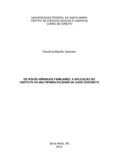| dc.contributor.advisor | Bopp, Maria Ester Toaldo | |
| dc.creator | Canzian, Carolina Manfio | |
| dc.date.accessioned | 2019-08-07T14:56:37Z | |
| dc.date.available | 2019-08-07T14:56:37Z | |
| dc.date.issued | 2018-07-04 | |
| dc.date.submitted | 2018 | |
| dc.identifier.uri | http://repositorio.ufsm.br/handle/1/17752 | |
| dc.description | Trabalho de conclusão de curso (graduação) - Universidade Federal de Santa Maria, Centro de Ciências Sociais e Humanas, Curso de Direito, RS, 2018. | por |
| dc.description.abstract | The present work approaches the several forms of constitution of the family nucleus in the contemporary society, especially in what refers to the phenomenon of the multiparenting. Thus, it was investigated the (in) existence of recognition legal, doctrinaire and jurisprudence concerning the pluriparenting institute in the Brazilian Right. The research part of the structural and functional transformations why the Brazilian society passed, starting from the decline of the system patriarchal to the ascension of the diversified mosaic of family entities, with the consequent effects in the juridical sphere. In the sequence, they were exposed the different family species, of relationships and of effective filiation in the current society. Later, it was treated of the multiparenting institute as form of constituting the family nucleus, the beginnings that base his recognition and the positioning of the Judiciary Power of States of São Paulo and of Rio Grande do Sul, of the Superior Tribunal of Justice and of Federal Supreme Court on the subject starting from the year of 2012. For the development of the proposed research, it was used the deductive approach method and the methods of historical and comparative procedure. It was verified that the social-affective parenting possesses juridical acceptance, meeting in the same level of importance that the biological bindings and registral, what represents the without biology of the kinships relations. It was ended that the multiparenting possesses wide acceptance in the doctrine and in the jurisprudence homelands, very away legislation doesn't exist regulating the implications coming of the emergency of the new family arrangements in the Brazilian sociocultural context. | eng |
| dc.language | por | por |
| dc.publisher | Universidade Federal de Santa Maria | por |
| dc.rights | Acesso Aberto | por |
| dc.subject | Direito de família | por |
| dc.subject | Relações de parentesco | por |
| dc.subject | Famílias recompostas | por |
| dc.subject | Socioafetividade | por |
| dc.subject | Multiparentalidade | por |
| dc.subject | Family law | eng |
| dc.subject | Kinships relations | eng |
| dc.subject | Recomposed families | eng |
| dc.subject | Social-affectivity | eng |
| dc.subject | Multiparenting | eng |
| dc.title | Os novos arranjos familiares: a aplicação do instituto da multiparentalidade no caso concreto | por |
| dc.title.alternative | The new family arrangements: the application of the multiparenting institute in the concrete case | eng |
| dc.type | Trabalho de Conclusão de Curso de Graduação | por |
| dc.degree.local | Santa Maria, RS, Brasil. | por |
| dc.degree.graduation | Direito | por |
| dc.description.resumo | O presente trabalho aborda as diversas formas de constituição do núcleo familiar na sociedade contemporânea, especialmente no que se refere ao fenômeno da multiparentalidade. Por meio desde, investigou-se a (in) existência de reconhecimento legal, doutrinário e jurisprudencial acerca do instituto da pluriparentalidade no Direito brasileiro. A pesquisa parte das transformações estruturais e funcionais por que passou a sociedade brasileira, a partir do declínio do sistema patriarcalista até a ascensão do diversificado mosaico de entidades familiares, com os consequentes efeitos na esfera jurídica. Na sequência, foram expostas as distintas espécies de família, de relações de parentesco e de filiação vigentes na sociedade atual. Posteriormente, tratou-se do instituto da multiparentalidade como forma de constituir o núcleo familiar, os princípios que fundamentam o seu reconhecimento e o posicionamento do Poder Judiciário dos Estados de São Paulo e do Rio Grande do Sul, do Superior Tribunal de Justiça e do Supremo Tribunal Federal sobre o assunto a partir do ano de 2012. Para o desenvolvimento da pesquisa proposta, utilizou-se o método de abordagem dedutivo e os métodos de procedimento histórico e comparativo. Constatou-se que a parentalidade socioafetiva possui aceitação jurídica, encontrando-se no mesmo patamar de importância que as vinculações biológica e registral, o que representa a desbiologização das relações de parentesco. Concluiu-se que a multiparentalidade possui ampla aceitação na doutrina e na jurisprudência pátrias, muito embora não exista legislação regulamentando as implicações advindas da emergência dos novos arranjos familiares no contexto sociocultural brasileiro | por |
| dc.publisher.country | Brasil | por |
| dc.publisher.initials | UFSM | por |
| dc.subject.cnpq | CNPQ::CIENCIAS SOCIAIS APLICADAS::DIREITO | por |
| dc.publisher.unidade | Centro de Ciências Sociais e Humanas | por |


